Formed in the early 1980’s in run-down post-industrial Manchester and against the backdrop of a political regime that was despised by most, Big Flame were a band at odds with most of the music around them. Featuring singer/bassist Alan Brown, drummer Dil Green and Greg O’Keeffe on guitar, they appeared to have a clear goal of challenging audiences’ perception of musical boundaries with abrasive and abstract live performances and a collection noisy angular 7” singles. Naturally, John Peel loved them and despite the band only being active for less than five years, he granted them four sessions – staggering when you think a band as iconic as The Smiths only achieved the same number. After featuring on the famous NME ‘C86’ cassette, the band called time following a final gig in Manchester in October 1986 and as agreed have never reformed since. Alan Brown continued in music, most notably in the much more melodic The Great Leap Forward, but they other members have been much more low key. PB: Big Flame were active before I started to really get into alternative music (I was just turning 15 when the band split up) and only really came across the music many years later on the re-issued ‘C86’ CD. Despite living in a Lancashire village about ten miles from Manchester, the bands I started to really like from that era were The Brilliant Corners from Bristol, The Chesterf!elds from Yeovil and The Bodines from Glossop, all bands that would fall under the general C86 moniker, but all bands that were more of the jingly jangly persuasion rather than the more discordant and angular sound made by Big Flame. .Having listened to the Peel sessions, I have warmed more to the sound, but still need to be in the right mood to appreciate it fully. I would imagine the live experience would have been more rewarding. Did you see yourselves as more of a performance-based project trying to make statements rather than a band aiming to make inroads into the charts and what were those early gigs like? GREG O’KEEFE: We were situationalist/anarchists The performance was the record and the record was the performance, but neither were the same. We felt that punk had trapped itself in too narrow a vibe that was too conservative in both content and in form. We wanted punk to be a continual revolution, that was both intellectually challenging as well as being an aesthetic experience. To make this happen we made the band an art project and attempted to both connect to# and distance ourselves from the audience by showing how much could be done in a very tight space. We called it hip difficult listening, or jazz fuck. Tt challenged the audience to stretch their musical understanding and learn to enjoy a discordant mess, but also engage with a live revolution of musical enjoyment.. ALAN BROWN: Needs ref to Statement of Intent: attitude-based (short term) project / charts were irrelevant or not a consideration - focus was on developing a sound that matched the attitude. (For me) that fell into place with the second EP ‘Rigour’ which went on to define bIG fLAME both musically and lyrically. The band was already a protest against the established; against the big companies, the strategy of how records ”should” be released, how music should sound. This was formulated in a manifesto, the BigFlame_Statement-of-intent (separate window). DIL GREEN: By the early 80s punk was dead, post-punk was what its name suggests - not anything really, just ‘after punk’ - lots of things happening, very little concentrated energy. At the start I think we were more of a reaction to that formlessness, lack of intensity. We were more interested in irritating an audience than entertaining it. After a bit, I think we realised that we had something musical going on which was definitely not easy listening, but had something that was ours, and we began to explore what that could be. It’s that stuff which seems to have had a legacy. PB: What other bands or indeed other things (literature etc.) influenced the band/band members? AB: Usual list! GO: We brought a series of very different influences to bigflame. Dil’s drums were referencing Hugo Bonham of the Gof4 and Joe Modeliste of the Meters…. Alan had a Postcard thing going, and I was inspired by funk, jazz and samba guitarists like Eddie Hazel and Charlie Byrd, and well as Gareth Sagar of the Pop Group and Andy Gill of the Gof4 DG: Would add Pete Best, drummer with the Au Pairs (Vygotsky: Zone of Proximal Development!), plus Latin jazz (zone of unattainable magic). PB: What was it like in Manchester back then? I only really started going into Manchester towards the end of the 80’s and remember the Northern Quarter and Ancoats (which are vibrant now) being quite rundown, a little bleak and edgy. I knew of Hulme, Moss Side and Whalley Range by reputation, but never ventured there until many years later. AG: Vibrant etc - ref: Greg’s ‘Peel Session’ notes GO: Manchester was a post-industrial mess in the early Eighties. The city was dead. You could spend a day wandering around Castlefield and not meet a soul. We would stare at the collapsing brick edifices of the industrial revolution and wonder if there was any future for kids like us. There were no jobs with any meaning anywhere. However at the same time it was so grim, that it was inspirational: you felt like you owned this crazy world. Hulme was a case in point. The collapsoscape of the failing monumental modernism was both terrifying and beautiful at the same time in a WB Yeatsian way. We channelled this terrifying beauty into the way played our instruments. It was brutal but inspirational, and we wanted the music to be just the same, but with a hidden tongue in cheek. DG: We were angry about Thatcher’s ‘80s but we never had it so good! Endless time, money was tight but no-one had any so it was fine - we had no responsibilities at all. We felt free to create, in a soup of others who felt the same. There was still a huge rent in the fabric of orthodoxy which punk had ripped and the system hadn’t figured out a way to full repair - look at the number ones in the early 80s- lots of drivel, but also some real strangenesses. PB: Do you think the back drop of Manchester back then and also the political climate influenced your output – the lyrics certainly have a strong political slant? AB: Ref: Greg’s Peel session notes / BF the organisation etc GO: Politics had failed by then. Thatcher was a monster, but Labour were completely useless and had no alternative. The miner’s strike crystallised this. Time had moved on, and organised capitalism was disintegrating… socialism had no answer to this and we felt so hopeless as the UK headed towards being the 52nd state of the US. There was a possibility of nuclear Armageddon too We were nihilistic and we had nothing to lose. We thought a revolution was necessary, but we didn’t know who to trust, so we made art…. DG:: We had no specific shared politics beyond anti Thatcher - playing miners’ strike benefits was obvious for us, Troops out (of Northern Ireland) was obvious, but there was no party or even sectarian affiliation - the lyrics are a mix of angry take-downs (]Man of Few Syllables’), lyrical despair ‘(Debra’ – “no soot on the sills”), and rabble rousing (‘turn your anger into energy - Make yourself think!). The 80’s was a mess, but at least politics felt worth having. PB: Were you surprised at the number of, highly sought after, Peel Sessions you achieved (four) in a relatively short time frame? AB: Not so much surprised as grateful? GO: I took everything for granted. We were the only good band at the time, so it was obvious we’d do loads of sessions, as there were hardly any interesting bands. That’s why we started bigflame in the first place - because modern music was becoming totally shit. Watching ‘Top of the Pops’ reruns of the 1980s on BBC Iplayer today you can see we were right! Punk and new wave had become a fashion; however we were still living in the crazy alternate universe of Hulme, and believed in punk as a life philosophy and a politic. DG: For me a mix of both the above - it was amazing - but as Greg says there was a lot of ram-al-ama going on, and we were clearly interesting and serious about doing something The sessions throw up some interesting and diverse cover versions of Wham, June Brides and Nancy Sinatra. All given a distinct Big Flame makeover. What was the story behind choosing those three songs? AB: Wham: backing band story / Popstars song and lyrics / Slow feath of… June Brides: mutual affection / /Every Conversation’ great pop song Nancy: Miner’s Strike / Boots Made for Working etc. GO I introduced the band to ‘These Boots’…It’s a classic song and I had a dream after I saw Madonna at the Hacienda that she would guest on it. I sent a letter, it was unanswered.. And then she became famous, and we continued to play it . It’s my only regret… June Brides…They were modern folk music…I felt we were Cubist in what we did and that we could re-imagine it and create a mash-up rather like the Clash had done to ‘Pressure Drop’. It’s got a massive guitar in it and the band hold the beat together in spite of it. I think it’s magnificent. Wham.. I wrote the sleeve notes that suggested that Dil and Alan were in the original Wham.. That was meant to show a key idea of anarchist thought, that the big lie is more believable than the small lie, and that has been proved to be correct… The actual song was very derivative, so at the end we added a bit from one of the black music songs it ripped off (‘Heat Wave’ by Martha Reeves and the Vandellas), as well as our own, one bar, token black music rip-off what was then a modern equivalent – ‘Movin and Groovin’ by Redds and the Boys, which was a big Go-Go tune I used to play at the Wilde Club. It was meant to question why no one was discussing the wholesale rip off of black music. It was a first take and it’s got great drumming by Dl! DG: There was a definite risk that we might come across as ‘clever’ / ‘intellectual’ and we were subverting that in our own songs all the time, but none of us listened to our own music at home! These covers I think were a nod to that. PB: With only a handful of singles to your name, are you surprised that there is still interest in the band now, nearly forty years on? AB: The limited number and format of releases was again deliberate (ref: Statement Of Intent), but looking at what we did in that short period of time and those who cite us as influential in the development of their careers… NME ‘C86’ GO: We were the only band that mattered (according to the Manic Street Preachers anyway). It was such a dumb time: you only have to try and listen to ‘C86’ to realise that. None of the bands on it produced anything remotely interesting or original (except the Mackenzies). They were all trying to make it, just as much as the bands that were on major record labels were. They really weren’t offering any alternative really, and most of the bands were completely artless,,, As far as I could tell they were only on an independent label because they either weren’t very good or weren’t very pretty or both. Thank God,Madchester came along a couple of years later.. DG: Actually - and this will come across as possibly grandiose - we actually did some interesting things musically - in a formal sense. Greg’s guitar is truly breathtaking at times - just so far outside. You’ll never hear anything like it- it’s really structured at the same time as being wild. As a sound engineer who was utterly bemused by us said – “You all stop at the same time, so you clearly know what you’re doing” We were doing something that added a tiny bit of a stretch to what ‘pop music’ can be. PB: I listened to a radio interview with Greg on the ‘C86 Show’ a few weeks back and he confirmed that the band made a pact never to reform after splitting up. Even with the wave of nostalgia for alternative bands from the 80’s, have you had offers of gigs and just not been tempted? Yes, and no. Though we might share a stage to tell you why we would never get back to play again. GO: It was the best decision ever: we have eternal youth DG: I am not even sure we should be doing this interview - or have had our pictures on the Peel release! Not for ‘ideological’ reasons, but more for what Greg is getting at. I am appalled by ‘Mojo ‘and ‘Q’ -it was awful seeing Sleaford Mods in a sit down venue with loads of fifty somethings (though they were great!). Nostalgia is bourgeois. Listen to great music - don’t fucking read about it! PB: Finally, Alan went on to form The Great Leap Forward with a much more melodic sound – was there a push within the band to move in this direction that led to the break up? AB: First of all, there was no break up - bIG*fLAME finished as opposed to breaking up - a pre-defined ending was in the plans for the band from the start. The Great Leap Fprward was nothing to do with the end of bIG*fLAME - that’s just the musical direction that Alan chose to go in post-bIG*fLAME - there’s nothing in the final releases that suggests otherwise - bIG*fLAME stayed true to their musical and attitudinal values to the end. GO: There was always a lot of tension and disagreement in the band. That’s what helped make the sound. After 3 years we thought we were too old to pontificate to our audience. In the end, Alan still liked indie music, Dill and I didn’t. I was more interested in hip hop, dub and jazz. I like the idea that bands should have short lives. How much better would modern music be if all those old guys such as New Order, U2, etc had packed in and allowed younger people to have a voice and their own revolution? I can’t believe people want to see 70 year old guys on stage playing pop music. That’s okay with music that needs erudite players like classical and jazz, but for pop it’s obscene: pop music ( and I include punk in this), is meant to be a young person’s genre, and those old guys have stolen it from their audience, and muted them. DG: “No Elvis, Beatles or the Rolling Stones” Clash ‘1977’ - one of the great things about punk is that there is not equivalent of those dinosaurs, no Led Zep, not Robbie Williams, No Oasis - all gone within the obligatory seven years for a late C20th musical/cultural revolution. I’m glad we did what we did, andI’m glad Alan has done what he has - they are different. Alan is a proper musician and songwriter - makes great songs. Big Flame were a shout of rage and joy and freedom and energy - no real ‘songs’. The two can overlap, but rarely. PB: Thank you. Top two photos by Mick Peek Lower photo by Laura Kennedy
Band Links:-
https://en.wikipedia.org/wiki/Big_Flame_(band)Play in YouTube:-
Have a Listen:-
Picture Gallery:-
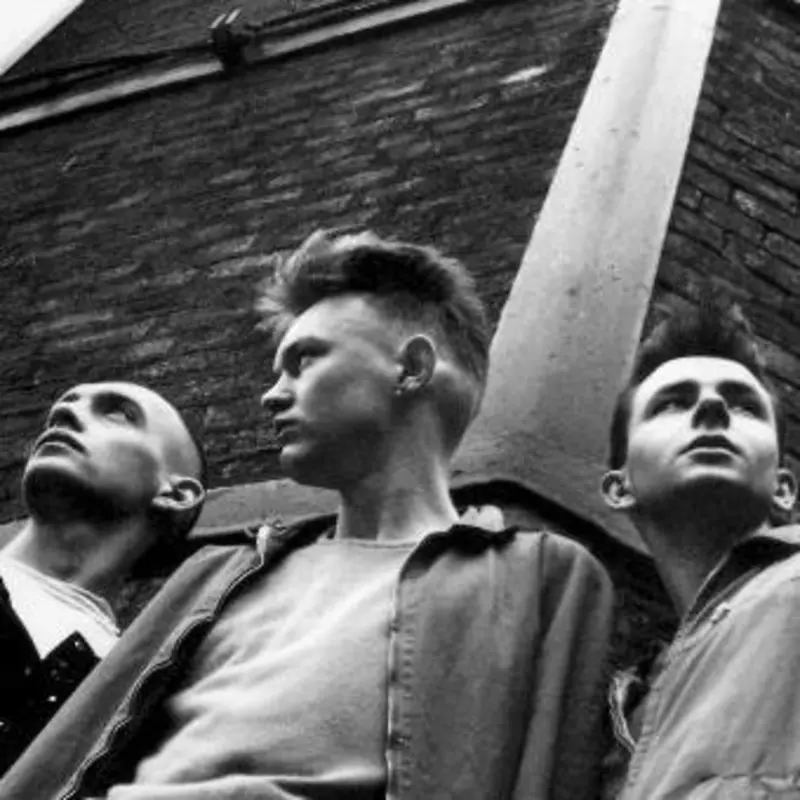
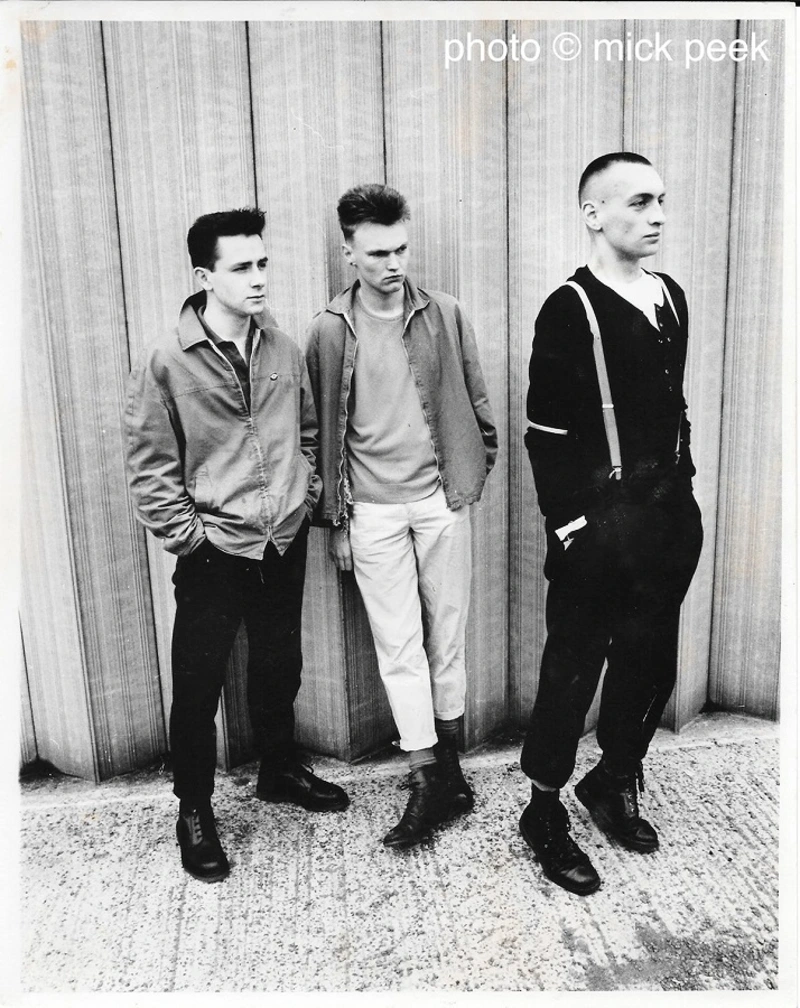
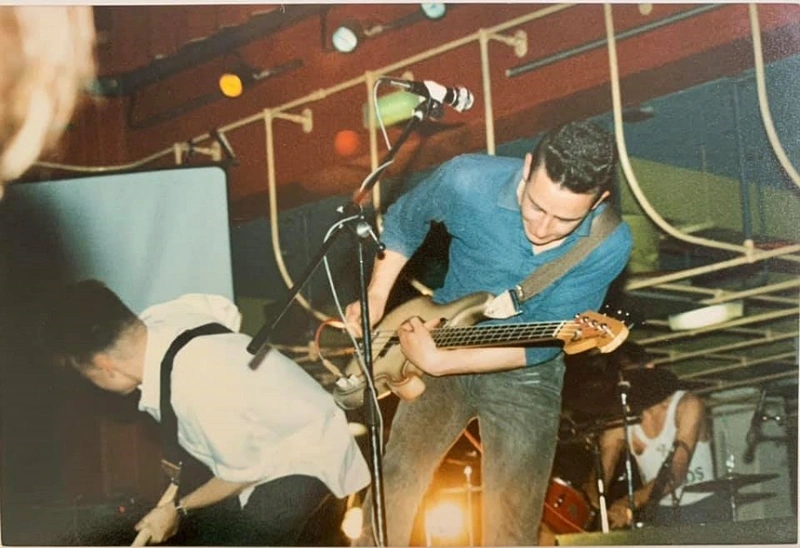
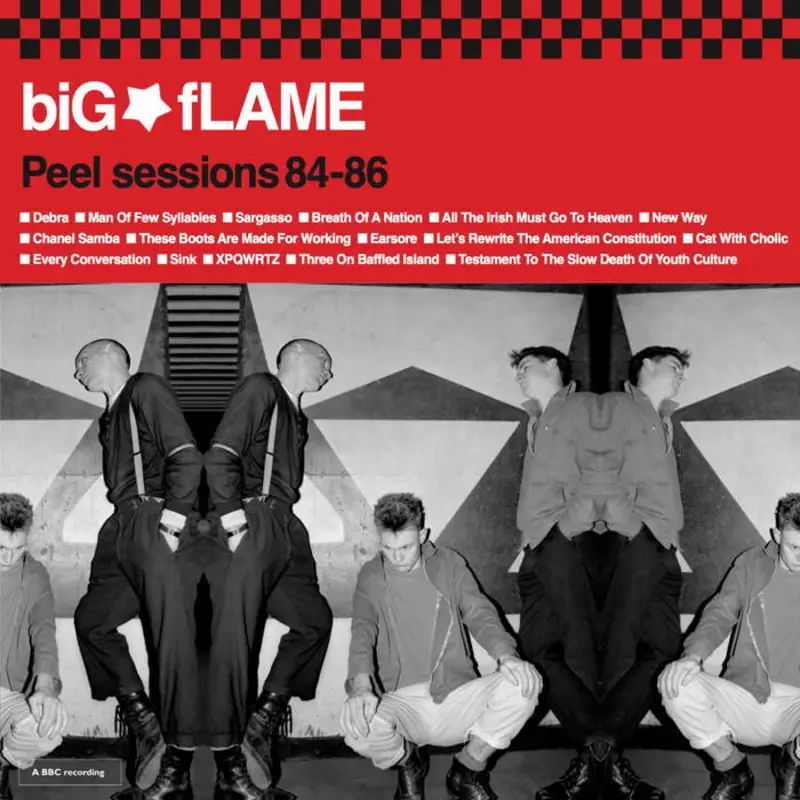
intro
Dixie Ernill speaks to abrasive 80’s trio Big Flame about challenging audiences musically and politically, their appearance on NME’s ‘C86’ tape and their ‘Peel Sessions’, which have just been released on Precious Recordings of London.
soundcloud
reviews |
|
Peel Sessions 84-86 (2025) |
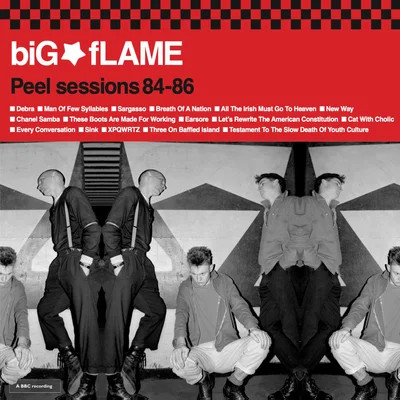
|
| Superbly packaged but divisive collection of four ‘Peel Sessions’ from mid-80’s Manchester post-punks Big Flame |
most viewed articles
current edition
Waterboys - Roundhouse, London, 1/6/2025Cary Baker - Down on the Corner: Adventures in Busking and Street Music
Lemonheads - O2 Ritz, Manchester, 16/8/2025
Last of the Lovely Days - Interview
Belouis Some - Video Vault
Brian Wilson - 1942-2025
Robert Forster - Interview
Motorcycle Boy - Interview
Tossing Seed - Interview
Morrissey - Photoscapes
previous editions
Miscellaneous - Minehead, Somerset, 8/5/2009...10/5/2009Stereogram Revue - Voodoo Rooms, Edinburgh, 2/12.2015
Ain't That Always The Way - Alan Horne After The Sound of Young Scotland 2
John Clarkson - A Life in Music
Dave Greenfield - 1949-2020
Bill Hicks - Profile
School - Interview
Bob Mould - Brooklyn Bowl, O2 Academy, London, 11/2/2016
That Petrol Emotion - That Petrol Emotion, Town and Country Club, London, 1988
Willard Grant Conspiracy - Ten Songs That Made Me Love...
most viewed reviews
current edition
Big Flame - Peel Sessions 84-86Silver Biplanes - Coming Up For Air
Suzie Ungerleider - Among The Evergreens
Bruce Dickinson - More Balls to Picasso
Good Charlotte - Motel du Cap
Wolf Alice - The Clearing
Kirk Adams and Ed Woltil - Eat The Sunshine, Drink The Starshine
Liarbillys - Vandalheart
Phew, Erika Kobayashi,, Dieter Moebius - Radium Girls
Rupert Wates - Father to the Man
Pennyblackmusic Regular Contributors
Adrian Janes
Amanda J. Window
Andrew Twambley
Anthony Dhanendran
Benjamin Howarth
Cila Warncke
Daniel Cressey
Darren Aston
Dastardly
Dave Goodwin
Denzil Watson
Dominic B. Simpson
Eoghan Lyng
Fiona Hutchings
Harry Sherriff
Helen Tipping
Jamie Rowland
John Clarkson
Julie Cruickshank
Kimberly Bright
Lisa Torem
Maarten Schiethart